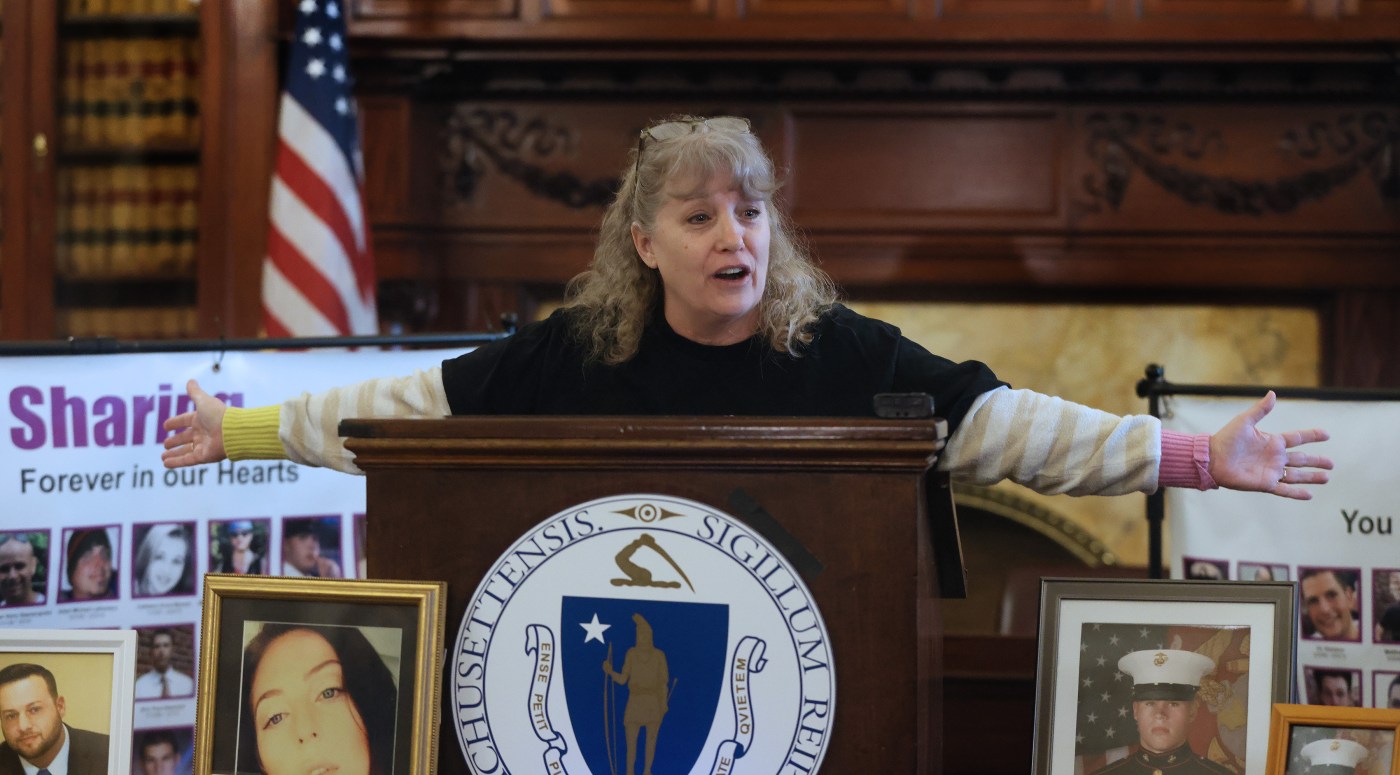
Mass. parents who lost children to overdoses push Beacon Hill to back prevention centers
Laurie McDougall was sitting outside her bathroom while her son was shooting up heroin on the other side of the door — or at least she thought it was heroin.
The drug was likely laced with fentanyl or xylazine, which increase the risk of a fatal overdose. But all McDougall could do at that moment was ask her son to just keep talking to her as she ran her “own overdose prevention center in my house and my bathroom.”
Only moments earlier, McDougall said she and her husband confiscated her son’s drugs, who came to her “with big, wide, frenzied eyes.” She knew her son did not want to hurt the family, only to satisfy a need. A few days before, he had overdosed “in that exact bathroom,” she said.
“He was lucky enough to survive because we knew what to do. But I don’t know if anybody in this room has any idea what it’s like to give chest compressions to dead weight, or to have to, me flip his body onto his side when he’s getting ready to vomit because of the Narcan,” McDougall said.
McDougall was part of a group of advocates who traveled to the State House to push for legislation that would authorize a 10-year pilot program for overdose prevention centers, sites where medical professionals monitor people while they use drugs and offer access to recovery services.
If people are alone trying to help someone through an overdose, they may not know what to do to help the person survive, McDougall said.
“This is why we need overdose prevention centers. This is why we need professionals who know what they’re doing and can help my son. And trust me, we did it all. Every bit of it,” she said while fighting through tears.
Overdose prevention centers have long been a topic of conversation at the State House as opioid overdose-related deaths have continued to ravage the state.
But supporters are hoping it will gain steam this legislative session after the Massachusetts Department of Public Health said the centers would help cut down the number of deaths. Robert Goldstein, the head of the department, called the sites potential “lifelines” in December even as the idea has been the subject of fierce debate on Beacon Hill.
Massachusetts had a record number of opioid-related overdose deaths in 2022, according to the Department of Public Health. Another 2,323 opioid-related overdose deaths occurred between Oct. 1, 2022, and Sept. 30, 2023, according to state data.
Lynn Wencus of Wrenthrum said an overdose prevention center may have saved her son Jeff, who died in February 2017 from an accidental overdose.
“There are no words that I can use to adequately describe what it feels like to lose a child,” she said at the State House. “But what I can tell you is that each morning when I open my eyes, I am panic-stricken. The heaviness in my chest is painful and I gasp to catch my breath.”
Wencus, McDougall, and other advocates are backing legislation from Reps. Marjorie Decker and Dylan Fernandes and Sen. Julian Cyr that would allow for a decade-long pilot program for overdose prevention centers that use harm reduction tools to prevent disease transmission and overdose deaths.
The bill requires a site to provide a hygienic space where people can “consume pre-obtained controlled substances,” sterile injection supplies, a way to collect used hypodermic needles and syringes, staff to monitor drug users for potential overdoses or to administer first aid, and referrals to addiction treatment.
The proposal charges the Department of Public Health with creating the rules that would govern an overdose prevention center, including by coming up with a way to apply for licenses, according to the bill text.
Rep. Kate Donaghue, a first-term Democrat from Westborough who has signed on as a supporter of the bill, said an overdose prevention center may have saved the life of her son, Brian Simpson, who died from an overdose almost six years ago in Quincy.
Overdose prevention centers, Donaghue said, save lives, connect people with resources, and reduce crime.
“Not that long ago, the idea of needle exchanges was something that was just anathema to people. Now, as people understand better that clean needles save lives, I think that it will be the same kind of gradual acceptance,” Donaghue said.


